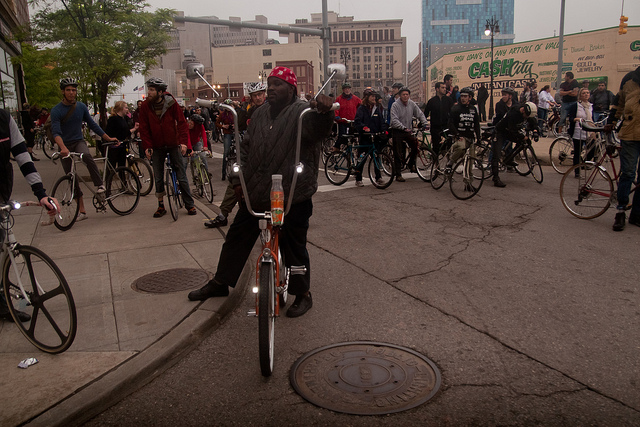As we watch ‘new Detroit’ set up shop, let’s not forget the good old one
“I hear outsiders talking about a ‘new Detroit’ when I remember the beauty of old Detroit,” -- jessica Care moore, poet
You’ve probably seen it -- a Politico article written by Suzette Hackney, a former Detroit Free Press reporter living in Toledo, asking whether there is room for black people in the “new Detroit.” As a black person in Detroit, I’d have to say there is.
It’s not so much the race angle of the piece that bothered me. I think it’s easy to ask that question, because it comes out of ignorance. We think that because certain narratives push forth the young, white entrepreneur as the saviors of Detroit, that there aren’t black people at all doing the same kind of work. (There are, they just don’t get the same kind of coverage. But that’s a column for a different day.)
What is troublesome is the newer narrative cropping up, the idea of a “New Detroit.” The Politico piece wasn’t the first, but it certainly won’t be the last to use the term.
A few years ago, I worked at MLive, where among my duties I chronicled the clichés often repeated in media accounts of the city. To this day, many stories chronicling the city’s slow comeback follow a paint-by-numbers approach: the DIY businessman, the overwhelming political challenges, the fear of the impoverished left behind.
But there is danger in calling something “new” when the “old” is very much alive and well. To call something “new” not only disrespects our elders, it carelessly erases history and discounts the accomplishments of those who made it possible for “new” to even exist.
On a Friday the 13th last year, I was laid off from my full-time journalism job. Until then, I'd never believed in the superstition of that day. But bad luck finally caught up with me.
The silver lining in that unlucky cloud was that I spent the last year as a freelance journalist, covering whatever I could successfully pitch to editors interested in Detroit. And I've learned more in that time then any other period of my career.
I spent a lot of time driving around the city, sometimes with purpose and sometimes aimlessly. Something you notice right off the bat is that it’s not just young white people moving into the city. There are immigrants taking up residence in the city’s southern portion. And there are those like myself, people who have grown up here, spent some time away and decided to come back.
White women in Highland Park preside over block clubs and tend community gardens, and black men provide mentoring programs to boys in need of guidance. There are people, regardless of race or gender, who are unsung in their achievements – perhaps because they don’t seek the spotlight, or because they’ve just done what they’ve always done without a second thought.
There are businesses all doing their part, be it the TV repair shop that still caters to console owners or the guy fresh out of barber college opening up his own shop. None will get the same treatment from food writers looking to declare Detroit as the next great culinary city, but they have purpose and should not be ignored.
There are black residents, still. It’s been said numerous times that the middle-class black population is fleeing to the suburbs. Who takes their place? Perhaps the young, unmarried professional ascending up the ladder – who happens to be black. Or maybe the newlywed couple moving out their apartment into a new University District home – who happen to be black.
And there are few journalists who actually see this, because few live in the city. I’ve had multiple conversations with other writers on the Detroit beat, and I hear the same thing: Only a few people in the newsroom – if any – live in the city. This isn’t to pit the city against the suburbs, because a city certainly needs them. But it’s easy to miss the stories of a city’s people when you’re not exposed to them every day.
When “new” is basically used as code for “white” in a city where the “old” is “black,” it can drive someone like me to think they’re obsolete. I should never have to question my own self-worth because of what someone else thinks is their idea for a city that has always been here.
Bury “new Detroit” in the cliché graveyard and embrace Detroit for what it is: A city rich in history with opportunity to make more history. No “old,” no “new,” just now.
See what new members are saying about why they donated to Bridge Michigan:
- “In order for this information to be accurate and unbiased it must be underwritten by its readers, not by special interests.” - Larry S.
- “Not many other media sources report on the topics Bridge does.” - Susan B.
- “Your journalism is outstanding and rare these days.” - Mark S.
If you want to ensure the future of nonpartisan, nonprofit Michigan journalism, please become a member today. You, too, will be asked why you donated and maybe we'll feature your quote next time!


 Black, white, old, new, two wheels, four -- it’s all Detroit, and it always will be Detroit. So don’t believe the hype. (Photo by Flickr user J. Singleton; used under Creative Commons license)
Black, white, old, new, two wheels, four -- it’s all Detroit, and it always will be Detroit. So don’t believe the hype. (Photo by Flickr user J. Singleton; used under Creative Commons license)